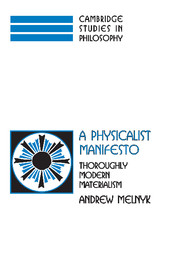Book contents
- Frontmatter
- Contents
- Preface
- Introduction
- 1 Realization Physicalism
- 2 But Why Not Supervenience?
- 3 Realizationism and R*d*ct**n*sm
- 4 Causation and Explanation in a Realizationist World
- 5 The Evidence against Realization Physicalism
- 6 The Evidence for Realization Physicalism
- References
- Index
- Titles in the series
Introduction
Published online by Cambridge University Press: 02 September 2009
- Frontmatter
- Contents
- Preface
- Introduction
- 1 Realization Physicalism
- 2 But Why Not Supervenience?
- 3 Realizationism and R*d*ct**n*sm
- 4 Causation and Explanation in a Realizationist World
- 5 The Evidence against Realization Physicalism
- 6 The Evidence for Realization Physicalism
- References
- Index
- Titles in the series
Summary
Gilbert Ryle once remarked that “there is no such animal as ‘Science’” (1954, 71). His point, of course, was not to deny the obvious existence of science but rather to emphasize the plurality of the sciences. Philosophers have sometimes made it seem as if there were only one science, namely, physics. But even a casual perusal of a university course directory reveals that there are plenty of others. For example, consider meteorology, geology, zoology, biochemistry, neurophysiology, psychology, sociology, ecology, and molecular biology, not to mention honorary sciences such as folk psychology and folk physics. Each of the many sciences has its own characteristic theoretical vocabulary with which, to the extent that it gets things right, it describes a characteristic domain of objects, events, and properties. But the existence of the many sciences presents a problem: how are the many sciences related to one another? And how is the domain of objects, events, and properties proprietary to each science related to the proprietary domains of the others? Do the many sciences somehow speak of different aspects of the same things? Or do they address themselves to distinct segments of reality? If so, do these distinct segments of reality exist quite independently of one another, save perhaps for relations of spatiotemporal contiguity, or do some segments depend in interesting ways upon others?
- Type
- Chapter
- Information
- A Physicalist ManifestoThoroughly Modern Materialism, pp. 1 - 5Publisher: Cambridge University PressPrint publication year: 2003



